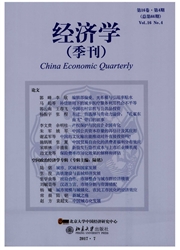
欢迎您!东篱公司
退出

 中文摘要:
中文摘要:
本文利用世界价值观调查数据,对中国收入不平等与居民主观幸福感之间的关系及其作用机制进行了实证研究。结论发现,中国的收入不平等对居民的主观幸福感有显著的负面影响,而且它对农村居民和低收入者的负面影响要显著大于城市居民和高收入者。此外,收入不平等除了自身对居民的幸福感有显著负面影响外,还通过社会犯罪间接地对居民的幸福感产生负面影响。
 英文摘要:
英文摘要:
This article estimates the relationship and mechanism between income inequality and residents' subjective well-being in China using the World Values Survey data. Our results show that income inequality has significantly negative effects on residents' subjective well-being. Specifically, the impacts on rural residents are higher than on urban residents, and impacts on low income earners are higher than high income earners. Moreover, income inequality can also create negative effects on people's subjective well-being by leading to more crimes.
 同期刊论文项目
同期刊论文项目
 同项目期刊论文
同项目期刊论文
 期刊信息
期刊信息
